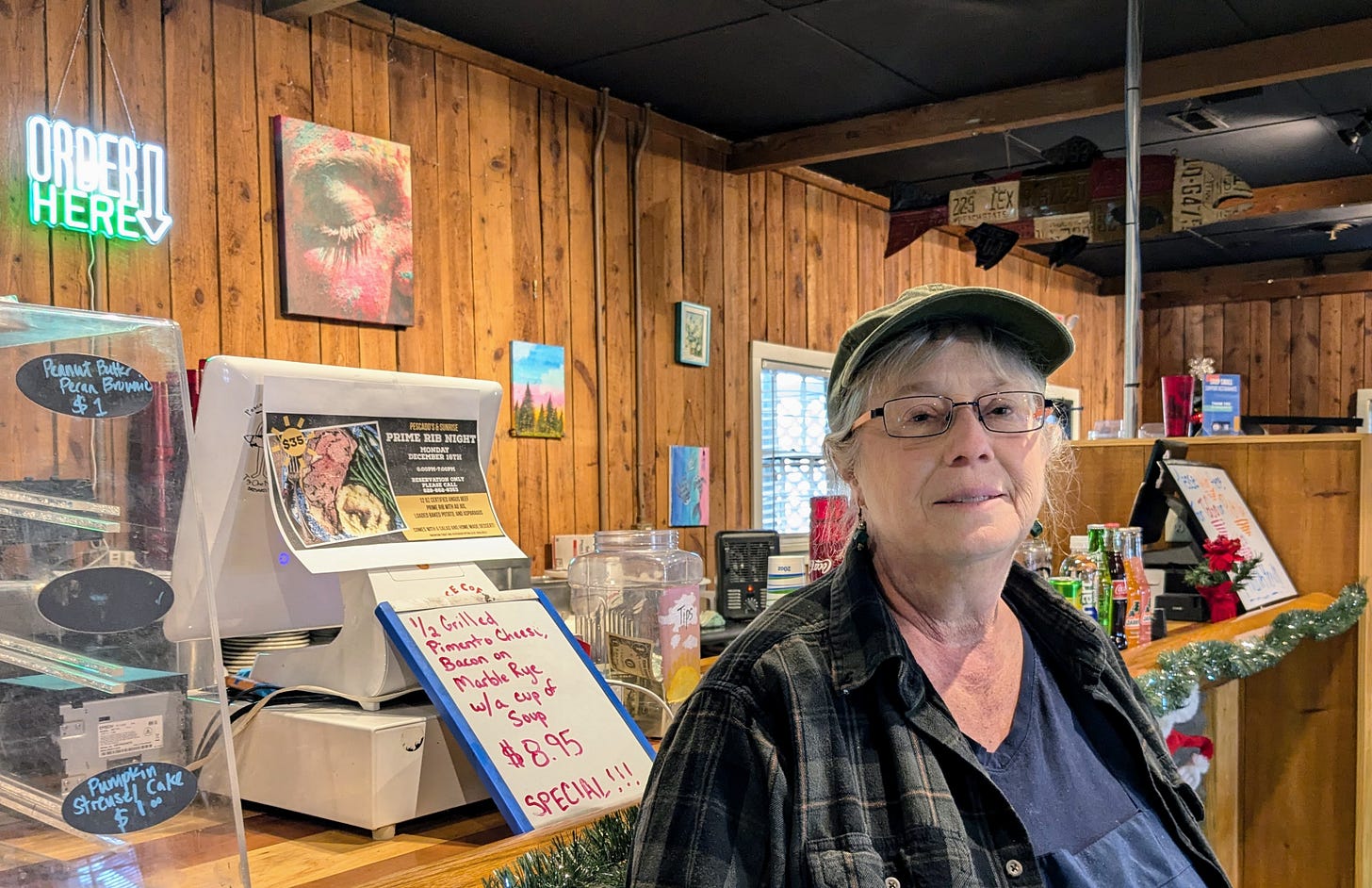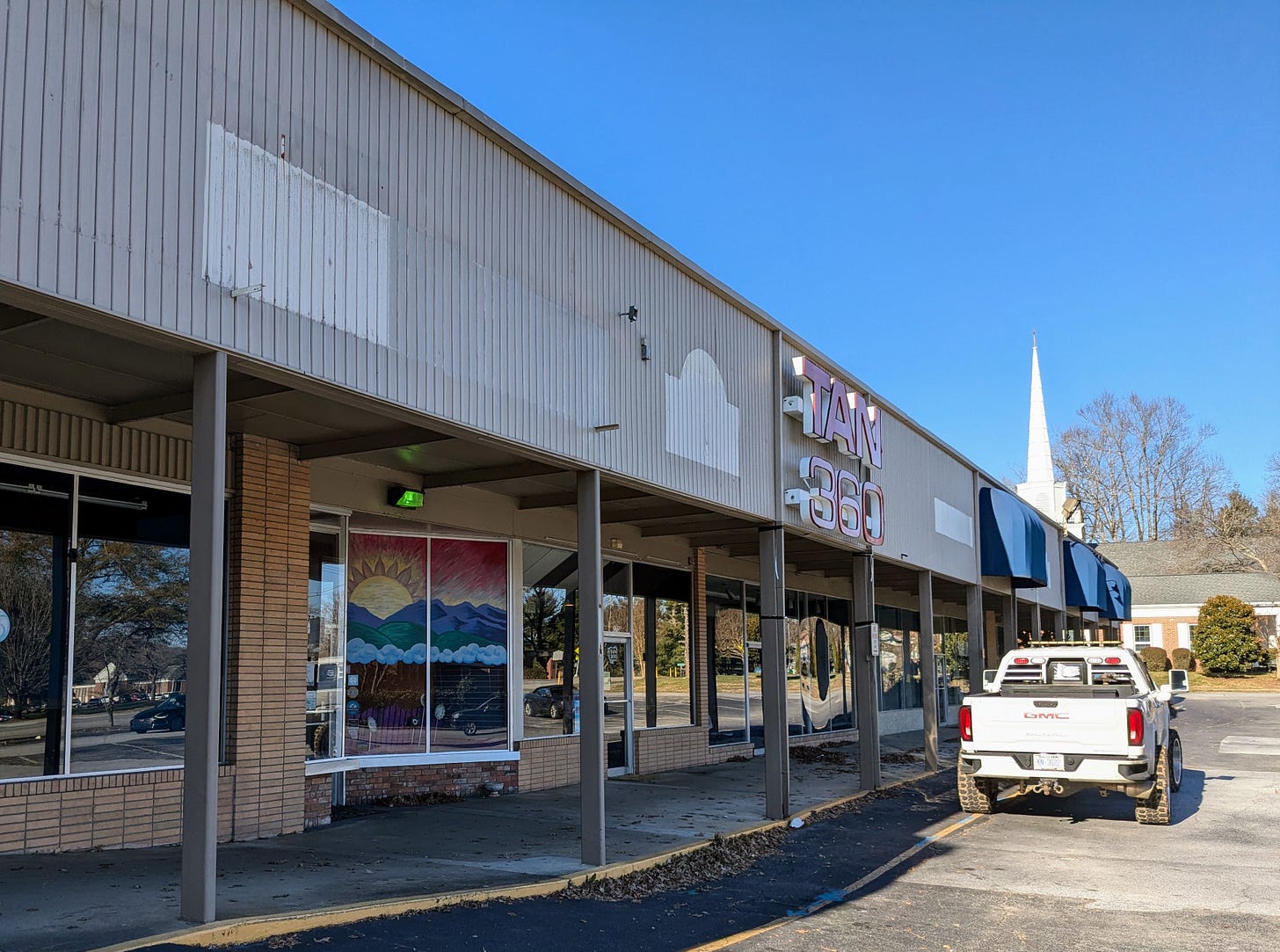From Business Bust to Healthcare Boom. Pardee Plans $18 Million Center at Old Plaza
The proposed healthcare center at remodeled College Plaza will bring investment, jobs and expanded medical services, while most of the Plaza’s former tenants have found new locations.

BREVARD — Omelets and wraps, bagels loaded with lox and cream cheese, built-to-order, just-about-football-sized burritos packed with beans, meat, salsa and veggies.
They have fueled workdays in Transylvania County for more than two decades and they’re still available if you know where to look for their much-loved purveyors, Sunrise Cafe and Pescado’s Burritos.
No longer situated side by side in College Plaza, the two restaurants have moved to a joint location just a little further along N Broad Street, the former site of Grammy’s Restaurant across from the entrance to Ingles Market.
Meanwhile, the old Plaza will become the home of a UNC Health Pardee medical center featuring a drive-through pharmacy, space for specialty care and the offices of 14 to 16 primary care clinicians.
Upon its completion, hopefully in early 2026, the $18 million center will provide much-needed, improved access to such practitioners, help fill the gap left by the reduction of services at Transylvania Regional Hospital and bring as many as 36 additional jobs to the county.
When news of the sale of the Plaza on the north end of downtown began to spread last spring, it was widely viewed as a potential death knell for tenants and — because the shopping center was a rare source of reasonably priced commercial space — a sort of general unwelcome mat for home-grown enterprise in Brevard.
Eight months later, that perception has shifted.
Though some owners of the more than one dozen businesses formerly housed at College Plaza recounted the difficulties of forced displacement, almost all have found new locations.
Considering both this and the potential benefits of the planned center, Brevard Mayor Maureen Copelof called Pardee’s announcement “a wonderful thing.”
“This will make a tremendous difference in the quality of medical care that is available locally to our residents,” she said.
The Plan
Along with an urgent care clinic and the offices of several medical specialists in the county, Pardee currently runs Pardee BlueMD, a cluster of eight primary care offices on Asheville Highway.
Those providers will move to the new center, where the nonprofit also plans to open six to eight new offices for such practitioners, said John Bryant, vice president of operations and support services at UNC Health Pardee.
Specialties including, potentially, “neurology, rheumatology (and) endocrinology,” will be offered at the center a day or two a week on a rotating basis according to the demand of patients, he said.
Transylvania is currently home to Pardee-affiliated cardiology and orthopedic offices, he said, and “you may also see some specialty rotations that complement the services that we already have in Transylvania County.”
The total cost of the project includes the $4.5 million to $6 million the company will invest in medical equipment, furniture and other fixtures needed to operate the center, Bryant said.
The development company, 277 N Broad Street Partners LLC, will lease the property to Pardee and retain ownership for the “foreseeable future,” according to a company press release, meaning the renovated structure will not receive tax exemptions typically available to nonprofit healthcare facilities.
County records show that the $2.6 million sale of the property closed late last month and that 277 N Broad has taken out a $14.6 million construction loan using the property as collateral.
Former owner Roger Galloway acknowledged in the spring that the 39,000 square-foot Plaza needed extensive renovation and at the time Andrew Riddle, a partner in 277 N Broad, promised a thorough revamping of the property.
Though Riddle did not provide further details this week, the company’s press release emphasized its use of an existing building to “reinvigorate the downtown with . . . public utility upgrades, new sidewalks, native plantings and a community center.”
Plans submitted to the city show the only enlargement of the building will be a slight height increase due to the construction of a cosmetic “parapet” wall intended to obscure rooftop equipment such as HVAC units.
This feature, as well as the materials and colors used in the exterior, are examples of upgrades to the plan that comply with the city’s in-the-works but not-yet-codified architectural standards, said Paul Ray, the city’s planning director.
“They made significant modifications to their plans so that it will look like something we want in Brevard,” Ray said of the developers.
Primary Care Shortage?
There’s no doubt that access to primary care is a key determinant of public health.
A recently published study, for instance, estimated that “560,000 cancer deaths could be averted over the next 20 years with increased screening,” John Kennedy, chief medical officer and president of the AMGA Foundation healthcare nonprofit wrote in an email.
“This is one example of the critical role primary care providers play in improving the health of their communities.”
Determining whether Transylvania faces a shortage of such providers, however, is more difficult to pin down.
Data from the University of North Carolina’s Cecil G. Sheps Center for Health Services showed that in 2023 Transylvania’s ratio of 1,107 residents per primary care clinician was significantly below its target rate of 1,500 residents per provider.
(“Lower is better,” an accompanying presentation clarified.)
But such numbers don’t necessarily represent actual availability, said Dr. Bryan Hodge, chief academic officer at Mountain Area Health Education Center (MAHEC), a nonprofit that works to train and retain healthcare providers in the region.
Transylvania, for example, is home to a higher percentage of retirement-age residents than any other county in the state.
“That translates to a lot more visits and demand,” Hodge said. Many of the county’s doctors are also older than 65, meaning they might work reduced hours, he said; they may have also retired since the collection of the most recently available data.
And even in Buncombe County — where the patient-to-clinician ratio is less than half that in Transylvania, according to the Sheps Center — providers “are screaming that they have a shortage,” Hodge said.
Data on “primary care density is one element that should be a really good predictor,” he said, “but then you actually have to get on the ground. How many people are accepting new patients?”
And the on-the-ground word from doctors at Pardee BlueMD clearly shows a shortage, Bryant said.
“Those eight providers right now have continual demand from individuals and citizens in Transylvania County seeking primary care access,” he said.
Primary care tends to be in short supply because it doesn’t generate as much income as many other medical services, said Barak Richman, a professor of law and business at George Washington University in Washington, DC, whose areas of study include the healthcare industry.
But family practices can boost revenues for medical systems by directing patients to facilities such as Hendersonville’s Pardee Hospital.
This strategy can, “at least in part,” undermine a key goal of primary care, which is “to keep people out of the hospital,” wrote Richman, who gained familiarity with North Carolina’s healthcare landscape in his previous position at Duke University.
But a potential benefit in Transylvania, he said, is increased competition for the owner of Transylvania Regional, Mission Health, which was purchased by for-profit Hospital Corporation of America (HCA) in 2019.
The company still offers an array of services at the facility, including outpatient rehabilitation, orthopedics and advanced imaging, Nancy Lindell , HCA’s director of media relations, wrote in an email.
But the city of Brevard’s ongoing federal antitrust lawsuit claims the company’s near monopoly in Western North Carolina had caused skyrocketing medical costs and “dramatically worsened facility conditions.”
“Any reliable medical (organization) that wants to open here and give people choice and options and get competition going — I am all for it,” Copelof said.
Joining Forces

Burton Hodges, executive director of the Transylvania Economic Alliance, said Pardee’s expansion has an important economic development benefit beyond its investment and job creation.
Communities with high levels of medical service, he said, are more attractive to entrepreneurs looking to move or expand their businesses.
“It’s no secret that improving healthcare in our community is a key priority,” Hodges said. “This (project) accomplishes that and will help trigger redevelopment.”
He said his organization helped several of the former College Plaza tenants find new locations. He and Copelof also said that, as far as they know, all the businesses that wanted to continue operation were able to do so in new spaces.
That includes the Tan 360 salon, whose owner Tricia Paxton previously vowed to require the developer to honor the two-year lease she signed shortly before learning of the Plaza’s planned sale.
Though neither Paxton nor Riddle revealed how that impasse was resolved, she said this week that her business will move to a shopping center on Rosman Highway just east of downtown Brevard.
“I’m excited about our new location. It’s bigger. It’s going to allow me to do more things,” she said. “It’s a really good move for me.”
Marisa Gariglio, who opened Sunrise 26 years ago, said she and Pescado owner Corey Gravely began to talk about joining forces in June.
One reason, she said, was the prohibitive rents advertised at other potential locations, two or three times as much as she paid at College Plaza. With the restaurants’ combined resources, she said, the lease payments of the new location are “doable.”
The two owners had also seen that the cafe and Pescados, which opened 21 years ago, already shared a customer base.
“We constantly saw people come up, you know, in a carload, and half of them would go to Sunrise, half of them would go to Pescados and then they come out and eat together on the patio,” said Gravely, who has owned the restaurant for more than a decade.
Gariglio learned from a supplier over the summer that the owners of Grammy’s were planning to retire.
After buying the business (not the building) in September, they temporarily ran it as a separate breakfast spot, the Easy Egg, before opening the combined restaurant in October.
The transition hasn’t been seamless, Gariglio said, listing obstacles including equipment breakdowns and difficulty in coordinating kitchen service.
Only in the “past couple of weeks,” she said, “have we really started smoothing it out and making it very workable.”
Which has allowed her to see the new location as an upgrade. Its two dining rooms and expansive patio have enabled the businesses to substantially increase seating capacity compared to heir old locations.
The shiny, corrugated metal front of the order counter creates a pleasing contrast to the rustic wood-paneled walls.
These are starting to fill up with one of the hallmarks of the old Sunrise, displays of local paintings and photographs. The menu has retained the unpretentious and reasonably priced standards that earned the two businesses such loyal followings.
Though they are now open only through the lunch hour, they have begun exploring the possibility of nighttime service by offering monthly prime rib dinners, the next of which is scheduled for Dec. 16.
One downside to moving, she said: Some customers couldn’t find the new location tucked among a stand of tall pines at North Broad and McLean Road.
But Gariglio has noticed an uptick in business since the recent unveiling of a sign beckoning drivers from the busy intersection. She’s also seen the delight of old customers rediscovering their longtime favorite restaurants still serving their longtime favorite meals, she said.
“I think most people are just so happy we were able to find a place and were able to move.”
Email: brevardnewsbeat@gmail.com





